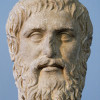“ The wicked man when old, is not, as Plato supposes (Republic) , more agitated by the terrors of another world when he is nearer to them, nor the good in an ecstasy at the joys of which he is soon to be the partaker. Age numbs the sense of both worlds; and the habit of life is strongest in death. ”
Plato, Phaedo. copy citation
| Author | Plato |
|---|---|
| Source | Phaedo |
| Topic | death age |
| Date | |
| Language | English |
| Reference | |
| Note | Translated by Benjamin Jowett |
| Weblink | http://www.gutenberg.org/files/1658/1658-h/1658-h.htm |
Context
“We should be ready to die of pity if we could see the least of the sufferings which the writers of Infernos and Purgatorios have attributed to the damned. Yet these joys and terrors seem hardly to exercise an appreciable influence over the lives of men. The wicked man when old, is not, as Plato supposes (Republic) , more agitated by the terrors of another world when he is nearer to them, nor the good in an ecstasy at the joys of which he is soon to be the partaker. Age numbs the sense of both worlds; and the habit of life is strongest in death. Even the dying mother is dreaming of her lost children as they were forty or fifty years before, 'pattering over the boards,' not of reunion with them in another state of being. Most persons when the last hour comes are resigned to the order of nature and the will of God.”
source



